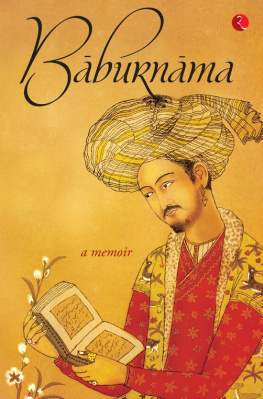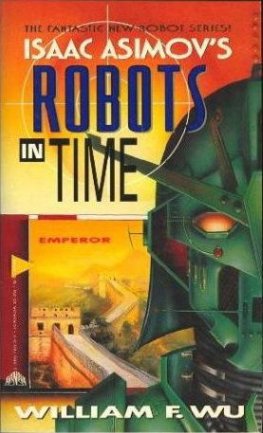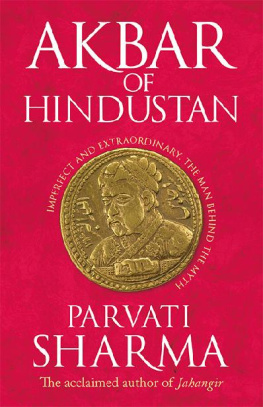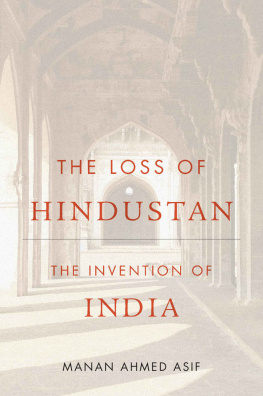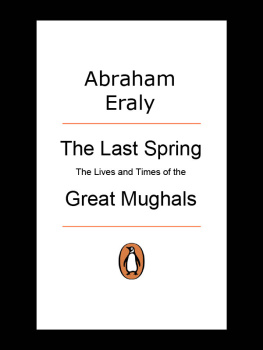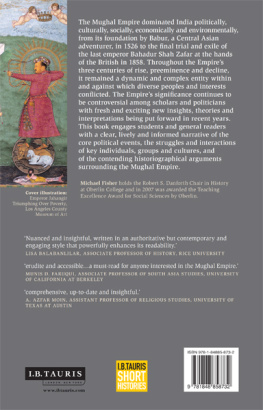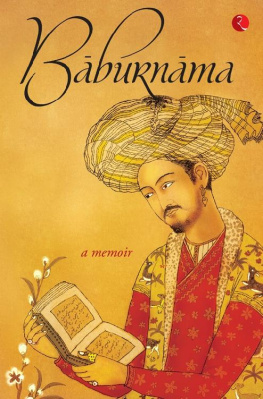Emperor of Hindustan Babur - Baburnama
Here you can read online Emperor of Hindustan Babur - Baburnama full text of the book (entire story) in english for free. Download pdf and epub, get meaning, cover and reviews about this ebook. year: 2017, publisher: Rupa Publications India, genre: Detective and thriller. Description of the work, (preface) as well as reviews are available. Best literature library LitArk.com created for fans of good reading and offers a wide selection of genres:
Romance novel
Science fiction
Adventure
Detective
Science
History
Home and family
Prose
Art
Politics
Computer
Non-fiction
Religion
Business
Children
Humor
Choose a favorite category and find really read worthwhile books. Enjoy immersion in the world of imagination, feel the emotions of the characters or learn something new for yourself, make an fascinating discovery.
- Book:Baburnama
- Author:
- Publisher:Rupa Publications India
- Genre:
- Year:2017
- Rating:4 / 5
- Favourites:Add to favourites
- Your mark:
- 80
- 1
- 2
- 3
- 4
- 5
Baburnama: summary, description and annotation
We offer to read an annotation, description, summary or preface (depends on what the author of the book "Baburnama" wrote himself). If you haven't found the necessary information about the book — write in the comments, we will try to find it.
Baburnama — read online for free the complete book (whole text) full work
Below is the text of the book, divided by pages. System saving the place of the last page read, allows you to conveniently read the book "Baburnama" online for free, without having to search again every time where you left off. Put a bookmark, and you can go to the page where you finished reading at any time.
Font size:
Interval:
Bookmark:
Bburnma
Bburnma
a memoir
Translated from the original Turkish text by
Annette Susannah Beveridge

Published by
Rupa Publications India Pvt. Ltd 2017
7/16, Ansari Road, Daryaganj
New Delhi 110002
Edition Copyright Rupa Publications Pvt. Ltd 2017
The views and opinions expressed in this book are the authors own and the facts are as reported by him/her which have been verified to the extent possible, and the publishers are not in any way liable for the same.
All rights reserved.
No part of this publication may be reproduced, transmitted, or stored in a retrieval system, in any form or by any means, electronic, mechanical, photocopying, recording or otherwise, without the prior permission of the publisher.
ISBN: 978-81-291-4175-0
First impression 2017
This book is sold subject to the condition that it shall not, by way of trade or otherwise, be lent, resold, hired out, or otherwise circulated, without the publishers prior consent, in any form of binding or cover other than that in which it is published.
INTRODUCTION
This book is a translation of Bbur Padshahs Autobiography, made from the original Turki text. It was undertaken after a purely-Turki manuscript had become accessible in England, the Haidarabad Codex (1915) which, being in Bburs ipsissima verba, left to him the control of his translators dictiona control that had been impracticable from the time when, under Akbar (1589), his book was translated into Persian. What has come down to us of pure text is, in its shrunken amount, what was translated in 1589. It is difficult, here and there, to interpret owing to its numerous and in some places extensive lacunae, and presents more problems than one the solution of which has real importance because they have favoured suggestions of malfeasance by Bbur.
My translation has been produced under considerable drawback, having been issued in four fasciculi, at long intervals, respectively in June 1912, May 1914, October 1917, and September 1921. I have put with it of supplementary matter what may be of service to those readers whom Bburs personality attracts and to those who study Turki as a linguistic entertainment, but owing to delays in production am unable to include the desiderata of maps.
CHAPTER I.
BBURS EXEMPLARS IN THE ARTS OF PEACE.
Bburs civilian aptitudes, whether of the author and penman, the maker of gardens, the artist, craftsman or sportsman, were nourished in a fertile soil of family tradition and example. Little about his teaching and training is now with his mutilated book, little indeed of any kind about his pr-accession years, not the date of his birth even, having escaped destruction. Happily Haidar Mirza (q.v.) possessed a more complete Codex than has come down to us through the Timurid libraries, and from it he translated many episodes of Baburiana that help to bridge gaps and are of special service here where the personalities of Bburs early environment are being named.
Bburs home-milieu favoured excellence in the quiet Arts and set before its children high standard and example of proficiency. Moreover, by schooling him in obedience to the Law, it planted in him some of Arts essentials, self-restraint and close attention. Amongst primal influences on him, his mother Qut-luq-nigars ranked high; she, well-born and a scholars daughter, would certainly be educated in Turki and Persian and in the home-accomplishments her governess possessed (tn q.v.). From her and her mother Aisan-daulat, the child would learn respect for the attainments of his wise old grandfather Yunas Khan. Aisan-daulat herself brought to her grandson much that goes to the making of a man; nomad-born and sternly-bred, she was brave to obey her opinion of right, and was practically the boys ruling counsellor through his early struggle to hold Farghana. With these two in fine influence must be counted Khan-zada, his five-years elder sister who from his birth to his death proved her devotion to him. Her life-story tempts, but is too long to tell; her girlish promise is seen fulfilled in Gul-badans pages. Umar Shaikhs own mother Shah Sultan Begim brought in a type of merit widely differing from that of Aisan-daulat Begim; as a town-lady of high Tarkhan birth, used to the amenities of life in a wealthy house of Samarkand, she was, doubtless, an accomplished and cultured woman.
Umar Shaikhs environment was dominated for many years by two great men, the scholar and lover of town-life Yunas Khan and the saintly Ahrari (i.e. Khwaja Ubaidul-lah) who were frequently with him in company, came at Bburs birth and assisted at his naming. Ahrari died in 8951491 when the child was about seven years old but his influence was life-long; in 9351529 he was invoked as a spiritual helper by the fever-stricken Bbur and his mediation believed efficacious for recovery (pp. 619, 648). For the babe or boy to be where the three friends held social session in high converse, would be thought to draw blessing on him; his hushed silence in the presence would sow the seed of reverence for wisdom and virtue, such, for example, as he felt for Jami (q.v.). It is worth while to tell some part at least of Yunas attainments in the gentler Arts, because the biography from which they are quoted may well have been written on the information of his wife Aisan-daulat, and it indicates the breadth of his exemplary influence. Yunas was many thingspenman, painter, singer, instrumentalist, and a past master in the crafts. He was an expert in good companionship, having even temper and perfect manners, quick perception and conversational charm. His intellectual distinction was attributed to his twelve years of wardship under the learned and highly honoured Yazdi (Sharafud-din Ali), the author of the Zafar-nama [Timurs Book of Victory]. That book was in hand during four years of Yunas education; he will thus have known it and its main basis Timurs Turki Malfuzt (annals). What he learned of either book he would carry with him into Umar Shaikhs environment, thus magnifying the family stock of Timuriya influence. He lived to be some 74 years old, a length of days which fairly bridged the gap between Timurs death [8071404] and Bburs birth (8881483). It is said that no previous Khan of his (Chaghatai) line had survived his 40th year; his exceptional age earned him great respect and would deepen his influence on his restless young son-in-law Umar Shaikh. It appears to have been in Umars 20th year (cir.) that Yunas Khan began the friendly association with him that lasted till Yunas death (8921483), a friendship which, as disparate ages would dictate, was rather that of father and son than of equal companionship. One matter mentioned in the Khns biography would come to Bburs remembrance in the future days when he, like Yunas, broke the Law against intoxicants and, like him, repented and returned.
That two men of the calibre and high repute of Ahrari and Yunas maintained friendly guidance so long over Umar cannot but be held an accreditment and give fragrance of goodness to his name. Apart from the high justice and generosity his son ascribes to him, he could set other example, for he was a reader of great books, the Qoran and the Masnawi being amongst his favourites. This choice, it may be, led Abul-fazl to say he had the darwesh-mind. Bbur was old enough before Umars death to profit by the sight of his father enjoying the perusal of such books. As with other parents and other children, there would follow the happy stilling to a quiet mood, the piquing of curiosity as to what was in the book, the sight of refuge taken as in a haven from self and care, and perhaps, Bbur being intelligent and of inquiring mind and Umar a skilled reciter, the boy would marvel at the perennial miracle that a lifeless page can become eloquentgentle hints all, pointers of the way to literary creation.
Next pageFont size:
Interval:
Bookmark:
Similar books «Baburnama»
Look at similar books to Baburnama. We have selected literature similar in name and meaning in the hope of providing readers with more options to find new, interesting, not yet read works.
Discussion, reviews of the book Baburnama and just readers' own opinions. Leave your comments, write what you think about the work, its meaning or the main characters. Specify what exactly you liked and what you didn't like, and why you think so.

